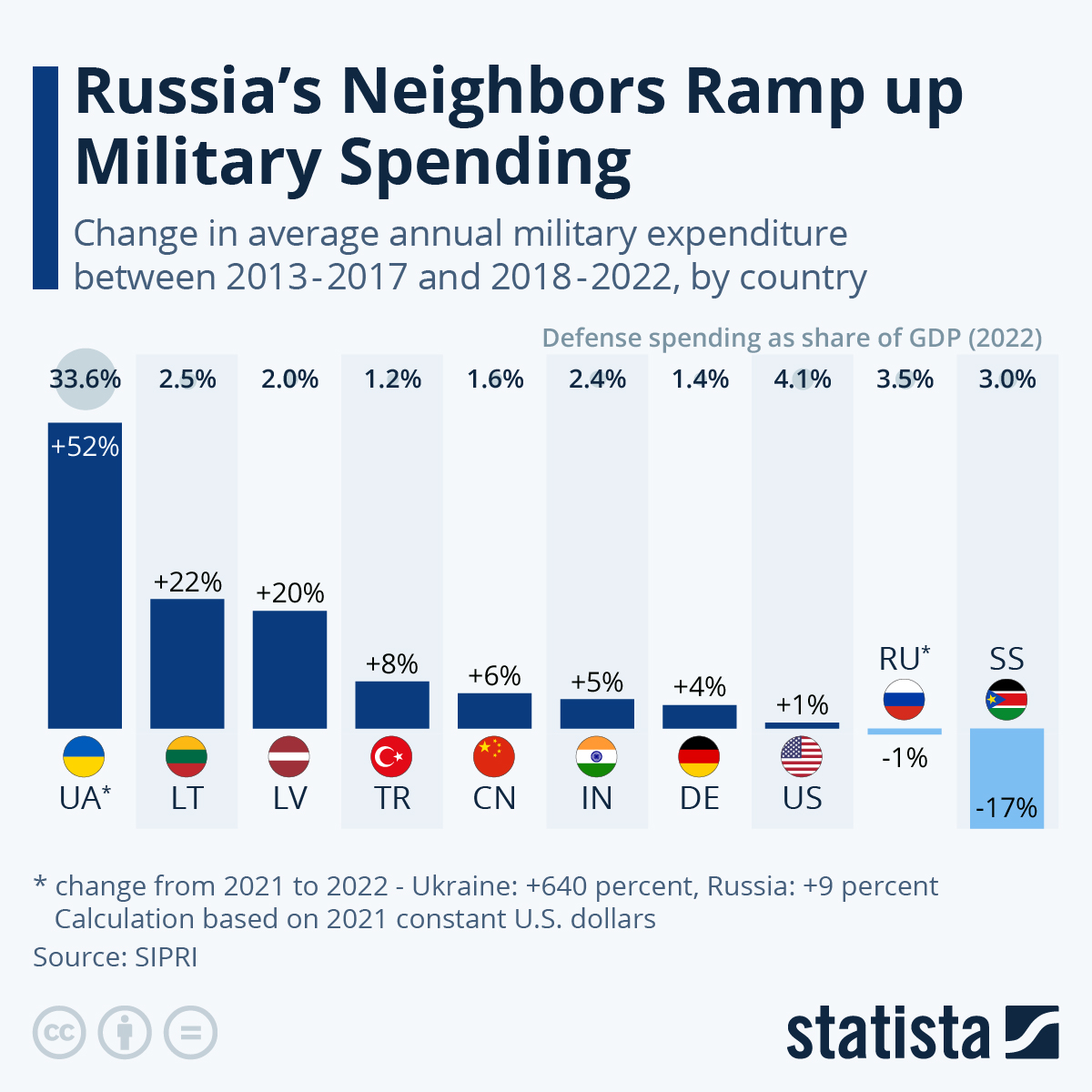
Russia's neighbors in Europe have upped their military spending since the invasion of Ukraine in early 2022.
But, as Statista's Katharina Buchholz notes, even before the war - over the course of the past decade - expenditure on defense had already increased substantially in these nations.
Perhaps most unsurprisingly, Ukraine itself shows one of the biggest increases measured by the Stockholm International Peace Research Institute.
Its military expenditure rose by 640 percent from 2021 to 2022 and a still very significant 52 percent per year on average in the past five years compared to the five before that. In 2022, defense spending made up a third of Ukrainian GDP, according to the data.
You will find more infographics at Statista
Some of the next biggest spending increases could be seen in Lithuania and Latvia - two of Russia's direct neighbors -, but also in other Eastern European countries like Hungary (average annual increase of 18 percent), Bulgaria (+16 percent), Slovakia (+15 percent) and Romania (+14 percent). Because military projects are usually large, one-time expenses and updates to them are infrequent, annual average are used for the chart. According to these annual averages, Russia has actually spent slightly less in the past 5 years on its military than it did in the five years prior to that. However, between 2021 and 2022, spending increased by 9 percent in the country.
Despite the steep increases, the share of GDP spent on defense remained in line with the NATO goal of 2 percent in the Baltic countries, which are NATO members. Western European countries like Germany but also Italy, Spain or the Netherlands, stayed quite far behind this goal despite moderate increases in spending. Other European nations at and slightly above the 2-percent mark are Poland, the UK, Estonia, Croatia, Serbia and Greece.
However, their spending had been at these levels since before the invasion of Ukraine.
Asian countries like India and China have grown their defense expenditure steadily over the past ten years.
Comparing to the GDPs of the respective countries, however, expenditure has grown roughly in line with GDP since 2013 and stood at around 2.4 percent in India and less than 2 percent in China last year.
One African country where defense expenditure has decreased substantially throughout the decade is crisis-ridden South Sudan, which saw a significant dip of -17 percent per year on average.
Africa was the continent whose spending dipped the most between last year and 2021. Several countries spent less on their military in 2022, for example Nigeria, Mozambique, Mali and Zimbabwe. Over the last ten years up until 2021, however, military spending had actually recovered on the continent from a low in 2018, before dipping again last year. Some African nations have bucked last year's trend and grew their defense spending - in absolute and relative terms - throughout the decade and into 2022. These include Burkina Faso - which grew expenditure by an annual average of almost 30 percent and doubled the share of GDP it spends on defense from around 1.5 percent in 2013 to more than 3 percent in 2022. Togo meanwhile had a similar average annual increase in the given time frame, but grew military spending as a share of GDP from 1.5 percent to more than 5 percent.
Russia’s neighbors in Europe have upped their military spending since the invasion of Ukraine in early 2022.
But, as Statista’s Katharina Buchholz notes, even before the war – over the course of the past decade – expenditure on defense had already increased substantially in these nations.
Perhaps most unsurprisingly, Ukraine itself shows one of the biggest increases measured by the Stockholm International Peace Research Institute.
Its military expenditure rose by 640 percent from 2021 to 2022 and a still very significant 52 percent per year on average in the past five years compared to the five before that. In 2022, defense spending made up a third of Ukrainian GDP, according to the data.
You will find more infographics at Statista
Some of the next biggest spending increases could be seen in Lithuania and Latvia – two of Russia’s direct neighbors -, but also in other Eastern European countries like Hungary (average annual increase of 18 percent), Bulgaria (+16 percent), Slovakia (+15 percent) and Romania (+14 percent). Because military projects are usually large, one-time expenses and updates to them are infrequent, annual average are used for the chart. According to these annual averages, Russia has actually spent slightly less in the past 5 years on its military than it did in the five years prior to that. However, between 2021 and 2022, spending increased by 9 percent in the country.
Despite the steep increases, the share of GDP spent on defense remained in line with the NATO goal of 2 percent in the Baltic countries, which are NATO members. Western European countries like Germany but also Italy, Spain or the Netherlands, stayed quite far behind this goal despite moderate increases in spending. Other European nations at and slightly above the 2-percent mark are Poland, the UK, Estonia, Croatia, Serbia and Greece.
However, their spending had been at these levels since before the invasion of Ukraine.
Asian countries like India and China have grown their defense expenditure steadily over the past ten years.
Comparing to the GDPs of the respective countries, however, expenditure has grown roughly in line with GDP since 2013 and stood at around 2.4 percent in India and less than 2 percent in China last year.
One African country where defense expenditure has decreased substantially throughout the decade is crisis-ridden South Sudan, which saw a significant dip of -17 percent per year on average.
Africa was the continent whose spending dipped the most between last year and 2021. Several countries spent less on their military in 2022, for example Nigeria, Mozambique, Mali and Zimbabwe. Over the last ten years up until 2021, however, military spending had actually recovered on the continent from a low in 2018, before dipping again last year. Some African nations have bucked last year’s trend and grew their defense spending – in absolute and relative terms – throughout the decade and into 2022. These include Burkina Faso – which grew expenditure by an annual average of almost 30 percent and doubled the share of GDP it spends on defense from around 1.5 percent in 2013 to more than 3 percent in 2022. Togo meanwhile had a similar average annual increase in the given time frame, but grew military spending as a share of GDP from 1.5 percent to more than 5 percent.
Loading…





